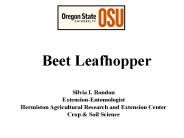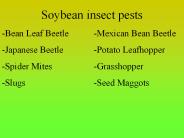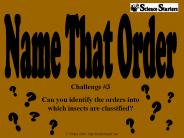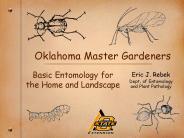Leafhopper PowerPoint PPT Presentations
All Time
Recommended
Beet Leafhopper. Silvia I. Rondon. Extension-Entomologist. Hermiston Agricultural ... Leafhopper (BLH): Circulifer tenellus. A wide variety of leafhoppers can ...
| PowerPoint PPT presentation | free to download
Potato Leafhopper Resistance
| PowerPoint PPT presentation | free to view
8. Transmitted by insects - leafhoppers (most important), plant hoppers. ... within the adult leafhopper; when the leafhoppers emerge from overwintering in ...
| PowerPoint PPT presentation | free to view
Grape Leafhopper. Grape Berry Moth. Grape Mealybug. Over winters in ... Grape Leafhopper Control. Late Spring through Berry Maturation - Carbaryl 4F 2-4 pt/ac ...
| PowerPoint PPT presentation | free to view
Grape leafhopper: serious pest in Central Valley. minor pest in Napa Valley. Why? ... Grape leafhopper, Erythroneura elegantula. diapauses as adults ...
| PowerPoint PPT presentation | free to view
It is transmitted by an African leafhopper. ... adjusting planting dates to avoid migrating leafhoppers landing on young plants. ...
| PowerPoint PPT presentation | free to view
Soybean insect pests-Bean Leaf Beetle -Mexican Bean Beetle-Japanese Beetle -Potato Leafhopper-Spider Mites -Grasshopper-Slugs -Seed Maggots
| PowerPoint PPT presentation | free to download
CORN LEAF BIGHT (VIRUS) MAIZE RUST (FUNGUS) CITRUS CANKER (BACTERIUM) POTATO LEAFHOPPER (INSECT) ... Immune (non-host) - no replication at all ...
| PowerPoint PPT presentation | free to view
(1) sucking mouthparts or none (2) gradual metamorphosis ... Aphididae. Food. Plant sap. Cicadas, leafhoppers, treehoppers, aphids, scales. HOMOPTERA ...
| PowerPoint PPT presentation | free to view
Assassin Bug. Green Lacewing. Honeybee. Lady Beetle Larva. Damage Classification: ... Chinch Bugs. Leafhopper. Lygus. Scale. Spider Mite ... Assassin bug ...
| PowerPoint PPT presentation | free to view
30-40% of fields require rhizomania resistant varieties. Sugarbeet Diseases ... Leafhopper vector. Two strains. Worland Strain. CFH Strain ...
| PowerPoint PPT presentation | free to view
Piercing-Sucking. Homoptera. aphids, leafhoppers. Pierce epidermal layer of plants and animals ... Suck up the exuding sap or blood. 3. Identify which insects ...
| PowerPoint PPT presentation | free to view
Arrows show when insects or damage are likely occur. Michigan Field Crops Insect Calendar April July June May Aug Sept Oct/Nov Alfalfa weevil Potato leafhopper
| PowerPoint PPT presentation | free to download
Wisconsin Vegetable Insects. Carrots, Celery, & Salad Greens. Aster Leafhopper Adult. Aster Yellows on Carrots. Aster Yellows Root Symptoms. Aster Yellows on Celery ...
| PowerPoint PPT presentation | free to view
Single, isometric (T=1) particles also found. MSV infected leaf. Leafhopper, Cicadulina mbila. Geminate Model Evolution. Negative Stain EM. Ping-Pong Model (1979) ...
| PowerPoint PPT presentation | free to view
Presented at IRRI Thursday Seminar Series, IRRI Chandler Hall Auditorium, ... worm (15), Green leafhopper (13), Gall midge (10), Thrips (10), Rice hispa (9) ...
| PowerPoint PPT presentation | free to view
To establish genetic relationships between the Phaseolus species. To tag more easily polygenic characters ... Drought, Heat, CBB, Leafhopper, Bruchid. P. acutifolius ...
| PowerPoint PPT presentation | free to view
How would you safely and effectively unplug a sprayer nozzle? ... a) potato leafhoppers b) aphids c) thrips d) spider mites e) flea beetles. Answer: b ...
| PowerPoint PPT presentation | free to view
Dinotefuran is a solid, soluble in water and other medium polarity organic solvents. It is used as an insecticide across various application areas. It is majorly used to control a wide range of pests, such as whiteflies, thrips, leafhoppers, aphids, mealy bugs, stink bugs, leaf miners, ants, cockroaches, fleas, flies, crickets, and gnats. Dinotefuran is a newly developed pesticide, which is used as an alternative to imidacloprid to control insects.
| PowerPoint PPT presentation | free to download
Neem oil has emerged as a powerful organic solution for ensuring the healthy growth of potatoes, helping to control a variety of pests without harmful chemicals. Neem oil, derived from the seeds of the neem tree, has long been valued for its pest control properties. It acts as a natural insecticide, fungicide, and miticide, making it a versatile tool for organic farming.
| PowerPoint PPT presentation | free to download
Lepidoptera Hint: We d love to catch a leopard-spotted butterfly. A. Orthoptera Hint: Grasshoppers love to hop! Remember the word hop in the name. * *
| PowerPoint PPT presentation | free to download
HEMIPTERA True bugs Ordinal Characteristics: (1) sucking mouthparts (2) simple metamorphosis (3) two pairs of wings, the first pair half-thickened, the
| PowerPoint PPT presentation | free to view
Spider Mites -Grasshopper -Slugs -Seed Maggots. Bean Leaf Beetle. Mexican Bean Beetle ... Grasshopper. Slugs. Seed Maggots. Pest Treatment and Management ...
| PowerPoint PPT presentation | free to view
Colorado Potato Beetle Adult. Colorado Potato Beetle Eggs. Colorado ... Potato Aphids. Potato Flea Beetle. Cutworms. European Corn Borer. Wireworm. White Grub ...
| PowerPoint PPT presentation | free to view
honeydew. Grape Mealybug. Adult. 0.2 inches long. 1 generation ... Almost all damage is caused by 1st generation of crawlers from summer brood. Honeydew causes ...
| PowerPoint PPT presentation | free to view
H. Hymenoptera. I. Mantodea. J. Phasmida. 1. Beetles & weevils. 2. Flies & mosquitoes ... Homoptera. E. Lepidoptera. H. Hymenoptera. I. Mantodea. A. Orthoptera ...
| PowerPoint PPT presentation | free to download
Beneficial Insects Commonly Found in the Garden and Landscape Beneficial Insects Commonly Found in the Garden and Landscape Assassin Bugs Assassin bugs prey on aphids ...
| PowerPoint PPT presentation | free to view
Corn earworm/tomato fruitworm. Thresholds. Economic Threshold ... Tomato Fruitworm. Monitor with pheromone trap. Bt is effective at controlling young larvae. ...
| PowerPoint PPT presentation | free to view
Major Insect Orders Odonata Lepidoptera Homoptera Hemiptera Orthoptera Coleoptera Hymenoptera Diptera Isoptera Thysanoptera Major Insect Orders Odonata Lepidoptera ...
| PowerPoint PPT presentation | free to download
aerobic, anaerobic, facultative. anaerobic. Nutritional requirement (C, N, {Biolog} ... Most are facultative parasites, Except fastidious bacteria and mollicutes ...
| PowerPoint PPT presentation | free to view
They can be found on many different hosts and on all parts of plants. Use of beneficial insects is a popular method of mealybug control in greenhouses.
| PowerPoint PPT presentation | free to download
Integrated Pest Management By: Matthew Burger and Kelly Brown What is IPM? Integrated Pest Management or IPM is an ecologically based pest control strategy.
| PowerPoint PPT presentation | free to view
Discover eco-friendly solutions for eliminating garden pests with organic pesticides. Learn about sustainable methods that are gentle on the environment while effectively safeguarding your garden.
| PowerPoint PPT presentation | free to download
Vegetable Insect Management PSS 124 ... schedule Any Questions? sweeping hopper burn egg nymph Peristenus digoneutis Celery Tomato Amaranth Eggplant beans Bell pepper ...
| PowerPoint PPT presentation | free to view
... TAXONOMIC HIERARCHY Kingdom: Animalia Phylum: Arthropoda Class: Insecta Order: Hymenoptera Family: Apidae Genus: Apis Species: mellifera Linn Ross ...
| PowerPoint PPT presentation | free to download
Discover the importance of insecticides in agriculture, their role in pest control, and their impact on crop health and yield.
| PowerPoint PPT presentation | free to download
XXI Congresso de Brasileiro de Entomologia. Recife, Brazil. Overview of Experimental Research ... Flanders, Finney, Bartlett, Hagen, (Harry) Smith, Sellers, ...
| PowerPoint PPT presentation | free to view
(High temp Low temp) 2 = Daily Average Temperature ... Tarnished Plant Bug. European Corn Borer. European Corn Borer Eggs. European Corn Borer 1st Instar ...
| PowerPoint PPT presentation | free to view
... thousands of acres of planted or prospective land for sugarbeet in Western U.S.(Bennett, 1971) ... Breeding Area. Biological control. Not effective due to ...
| PowerPoint PPT presentation | free to download
Title: Gifted Education Section Curriculum Development Institute, Education Bureau Author: Hon Chim Chiu
| PowerPoint PPT presentation | free to download
Growth regulator production by plant disrupted: witches' brooming. Phytoplasmas overwinter in infected weed hosts and perennial ornamentals. Black-eyed Susans ...
| PowerPoint PPT presentation | free to view
Predator Parasite or Pathogen? A show adventure in Biological Control Erica Jenkins, Michigan State University Pesticide Education Wasp larvae coming out of a ...
| PowerPoint PPT presentation | free to download
Dinotefuran Market is forecast to reach $966.36 million by 2025, after growing at a CAGR of 5% during 2020-2025. Dinotefuran is a modern neonicotinoid insecticide developed by Mitsui Chemicals which is used to maintain public health as it has low mammalian
| PowerPoint PPT presentation | free to download
Agronomy CDE Insect Identification, Life Cycle, and Economic Impact Honeybee Honeybee Life Cycle: Complete Economic Impact: None or predatory Japanese Beetle Japanese ...
| PowerPoint PPT presentation | free to download
BIOCONTROL
| PowerPoint PPT presentation | free to view
different types of insect-pests which cause damage to crop, livestock and others.....their symptoms and identification
| PowerPoint PPT presentation | free to download
Neem oil pesticide is deemed harmless for beneficial insects like butterflies & ladybugs since it doesn't target bugs that don't eat leaves. It is systemic in action, mainly affecting the feeding as well as growth and development of insects. Nothing will happen immediately even if you spray the oil on insects directly, so people often come to the conclusion that neem oil is ineffective. However once ingested by insects, Neem oil causes insects to reduce or cease feeding, can prevent larvae from maturing, reduces or interrupts mating behavior, and, in some cases, the oil coats the breathing holes of insects and kills them.
| PowerPoint PPT presentation | free to download
Rule of thumb: One insect per 10 sweeps per inch of plant height. Economic Threshold ... If green-up is slow, wait/watch for new buds before plowing down ...
| PowerPoint PPT presentation | free to view
Oklahoma Master Gardeners Basic Entomology for the Home and Landscape Eric J. Rebek Dept. of Entomology and Plant Pathology ...
| PowerPoint PPT presentation | free to download
Is your place was filled with pests? Doorstep Hub is here to provide a pest control services at your place. We prefer trained pest serviceman to provide the best services as well as we offer the minimum warranty up to 6 months and a maximum up to 5 years. http://tiny.cc/my1t9y https://tinyurl.com/ug6d894
| PowerPoint PPT presentation | free to download
This nematode is present in all parts of the world and can infect every vegetable ... Attacks by the nematode just behind the growing tip of the root cause excessive ...
| PowerPoint PPT presentation | free to view
... cover crop in the United States Very high yield legume Very good pasture crop Description Is a herbaceous perennial legume ... hay crops Has highest feed value ...
| PowerPoint PPT presentation | free to download
Manipulate the environment to the crop s advantage and to the ... approach to pest management Entomology Plant Pathology Nematology Weed Science Crop ...
| PowerPoint PPT presentation | free to view
Insects of Saddlerock: Hymenoptera Ants, Bees, Wasps
| PowerPoint PPT presentation | free to view
Neem is perceived today as a characteristic item which has much to offer in comprehending worldwide farming, ecological and general wellbeing issues. It is considered as a profitable instrument for practical advancement. Specialists worldwide are currently concentrating on the significance of neem in the agrarian business.
| PowerPoint PPT presentation | free to download
























































